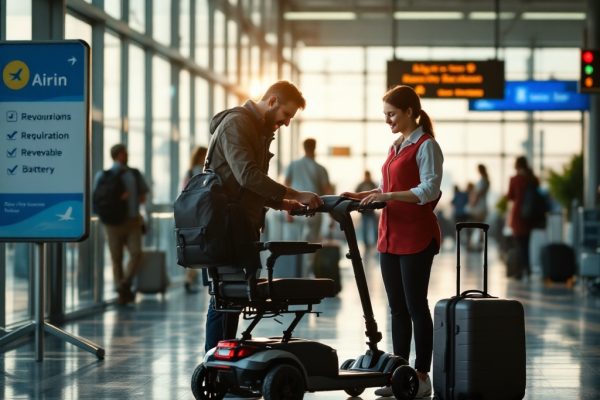Can Dialysis Patients Travel by Air: Travel Advice
Dreaming of travel while on dialysis? It’s absolutely possible! This guide provides essential information for planning safe and comfortable air travel, from pre-trip consultations with your doctor and arranging dialysis at your destination to managing medications and understanding international health insurance cards like EHIC and GHIC. Learn how to prepare for a smooth journey, empowering you to experience the joy of travel while managing your health. Start planning your next adventure today!
Important information

- Consult your doctor before flying to discuss your travel plans and ensure you are healthy enough for air travel.
- Plan dialysis treatments at your destination in advance. Start planning 6-8 weeks before your trip to arrange treatments and confirm details with the center.
- Carry all essential medical documents, including dialysis records, prescriptions, and a doctor’s letter outlining your condition.
- Pack sufficient medication and essential dialysis supplies in your carry-on luggage. Bring extra medication in case of travel delays.
- Inform the airline about your dialysis needs to ensure a smooth check-in and boarding process.
Understanding Air Travel for Dialysis Patients
Traveling with dialysis requires planning, but it’s definitely possible. Here’s how to make it work:
Consult your doctor. Discuss your travel plans and any potential health concerns with your physician to ensure you’re fit to travel.
Plan your treatments. Schedule your dialysis sessions around your travel itinerary to maintain your treatment schedule.
Confirm dialysis center availability. Ensure a dialysis center is available at your destination and can accommodate your treatment needs.
Carry medical documents. Bring all necessary medical documents, including your dialysis records and prescriptions, with you during your travels.
Inform the airline. Notify the airline about your dialysis needs in advance to ensure a smoother check-in and boarding process.
With the right preparation, dialysis patients can enjoy safe and comfortable flights.
Can Dialysis Patients Fly Safely?
Traveling on dialysis requires careful planning. Consult your doctor to ensure you’re healthy enough to fly. Also, arrange dialysis at your destination for a safe and smooth trip.
Benefits of Travel for Dialysis Patients
Traveling can significantly boost the mental well-being of dialysis patients, lifting their spirits and reducing stress. This positive impact leads to a better overall quality of life, a finding confirmed by numerous studies. This is particularly crucial for individuals managing chronic illnesses like dialysis. Doctors often encourage travel for these patients, provided they maintain stable health. Travel can involve exciting new adventures, like exploring unfamiliar destinations or reconnecting with loved ones. Sometimes, a simple change of scenery is all it takes to enhance their lives.
Preparation and Planning for Air Travel
Begin planning your air travel six to eight weeks in advance to allow ample time for arranging dialysis at your destination and confirming details with the center.
Before you go, consult your healthcare team to ensure you’re fit for travel and discuss any necessary precautions, such as special medications.
Transplant recipients should also inform their coordinator about their travel plans.
Consulting Your Healthcare Team
Before traveling, consult your doctor for a personalized health assessment. They can determine if flying is safe and offer tailored advice to ensure a healthy trip, including recommending precautions based on your specific needs.
Informing Your Transplant Coordinator
Keeping your transplant coordinator informed of your travel plans is essential for seamless care. This allows them to make necessary medical arrangements, prepare any required documents, and update your records. They can also connect with healthcare providers at your destination, should the need arise, and advise you on how travel might affect your transplant and post-transplant care. Inform your coordinator about your travel plans to ensure the best possible care during your trip.
Ensuring Health Stability Before Traveling
Before traveling, dialysis patients should ensure they’re in stable health. This is crucial and requires checking with your doctor and managing medications. While doctors typically approve travel for stable patients, careful planning with your healthcare team is essential for a safe and healthy trip. Here’s what you need to do:
Consult your doctor. Ensure your health is stable enough for travel.
Manage your medications. Ensure you have enough for your trip and they are stored correctly.
Plan with your healthcare team. Discuss your travel plans and any necessary precautions.
Medical and Safety Considerations
Traveling with dialysis requires careful planning. Pack enough medication for your entire trip, plus extra in case of delays. Create a detailed list including medication names, dosages, and administration times, keeping it with your medical records. Consult your doctor before your flight to ensure you have the right medication plan. Pack essential dialysis equipment and other medical supplies in your carry-on for easy access. Finally, review the airline’s rules for medical equipment. Here’s a step-by-step guide:
Pack sufficient medication. Bring enough for your trip, plus extra to account for unexpected delays.
Create a medication list. Include medication names, dosages, and times. Keep this list with your medical records.
Consult your doctor. A pre-flight consultation will ensure your medication plan is suitable for travel.
Pack essential supplies. Keep dialysis equipment and other medical supplies in your carry-on luggage.
Review airline regulations. Check your airline’s specific rules regarding medical equipment on flights.
Medication Management and Supplies
Pack enough medication for your entire trip, including prescriptions. Ensure essential dialysis supplies are readily accessible throughout your journey.
Travel Logistics and Safety Tips
Traveling with medical conditions requires careful planning. Here’s what you should keep in mind:
Pack essential documents. These include a doctor’s letter outlining your condition, your dialysis prescription, and a comprehensive list of your medications.
Contact dialysis centers at your destination in advance. This will allow you to schedule your treatments and ensure their availability upon arrival.
Check airline regulations for carrying on dialysis supplies and medical equipment. Understanding these rules will help ensure a smooth and hassle-free trip.
Carrying Medical Records and Important Documents
When preparing for your trip, pack essential medical documents, such as: medical records, dialysis prescriptions, and a doctor’s note outlining your condition. Also include contact information for your nephrologist and dialysis center, copies of lab results and insurance cards, and a list of your medications.
Arranging Dialysis at the Travel Destination
Traveling with dialysis can be a smooth experience. Many dialysis centers readily accommodate out-of-town patients. Contact centers at your destination to check their availability and specific policies. When scheduling treatments, build them around your travel plans and book these sessions well in advance. A flexible itinerary is recommended, allowing you to adapt to unforeseen circumstances. Travel insurance is also a wise consideration, as it can cover unexpected medical costs. Be sure to confirm the specifics of your coverage.
Contact dialysis centers at your destination. Check their availability and specific policies.
Schedule your treatments around your travel plans. Book these sessions well in advance.
Maintain a flexible itinerary. This allows you to adapt to unforeseen circumstances.
Consider travel insurance. It can cover unexpected medical costs.
Confirm the specifics of your coverage. Ensure it meets your needs.
Managing Dialysis Supplies and Medical Equipment
Traveling with dialysis equipment requires careful planning. Pack enough supplies for your entire trip, plus extras in case of delays. Use a portable cooler for temperature-sensitive medications. Protect your equipment during travel and prepare for unexpected issues. Bring extra batteries for electronic devices and clearly label all medications.
Traveling Internationally with Dialysis
Planning international travel with dialysis requires careful preparation. Before you go, research dialysis centers at your destination and confirm they can accommodate your specific treatment needs. Contact your insurance provider to understand the specifics of your policy and coverage options abroad, such as the European Health Insurance Card (EHIC) and Global Health Insurance Card (GHIC). Remember to carry essential medical records and consider establishing a local contact for added support. With careful planning, your trip can be smoother and more enjoyable.
Using the European Health Insurance Card (EHIC) and Global Health Insurance Card (GHIC)
The European Health Insurance Card (EHIC) and Global Health Insurance Card (GHIC) provide essential medical coverage for necessary state-provided healthcare during European trips. However, they shouldn’t replace travel insurance. Travel insurance covers additional expenses like mountain rescue and repatriation, which the EHIC and GHIC don’t. Both cards cover pre-existing conditions, including chronic illnesses such as dialysis. However, treatment, including dialysis, adheres to the host country’s regulations. Therefore, contacting the local healthcare authority beforehand is crucial for a smooth and appropriate care experience.
Travel Tips and Recommendations
Pack essential medications in your carry-on.
Verify your destination dialysis center’s details and keep emergency contacts readily available.
Confirm flight and hotel reservations and consider travel insurance.
Arrive at the airport early and stay hydrated throughout your journey.
Inform airline staff of any needs, such as boarding or seating assistance, to ensure a smoother trip.
Always carry necessary medical documentation.










